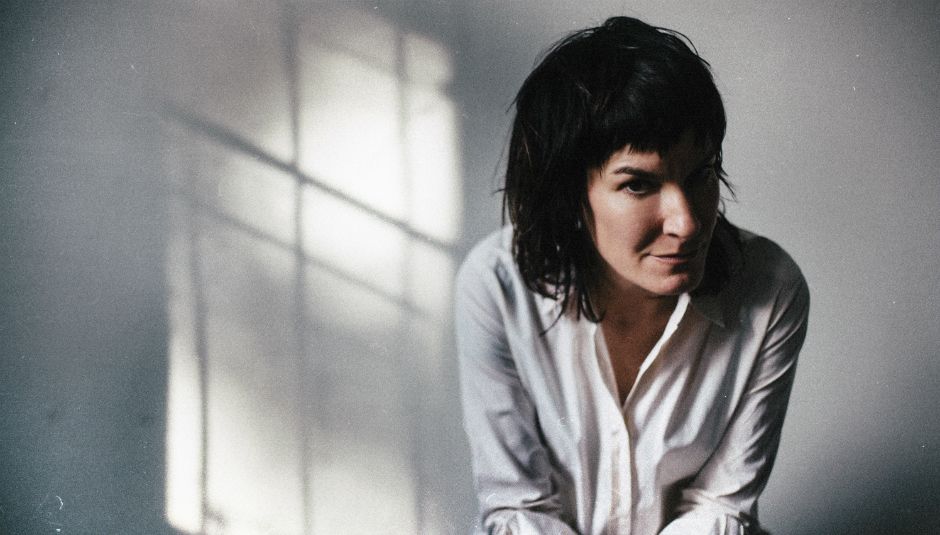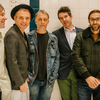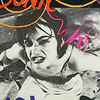Jen Cloher’s third, self-titled album was one of the most talked about and acclaimed records of 2017. As well as being her most political to date, it was also her most honest. “It’s self-titled,” Cloher simply says, when asked to describe the album.
Candidly exploring the difficulties of being in a long-distance relationship with her long-term partner and fellow singer, Courtney Barnett, Cloher explores the loneliness she felt during long periods of absence. “I did ask Courtney: ‘How do you feel about this…these lyrics are very honest?’ She was like, ‘No, they’re great’…I think if I pretended that those challenges of the long distance on our relationship [didn’t happen], or if I'd skipped that…it wouldn’t have brought the emotional depth to this album.”
Politically, Cloher’s album also deals with the civil rights issues surrounding the divisive equal marriage vote in her native Australia. The album’s politics chimed with many – not just in Australia, but around the world. “Paralyzed… While the Hansonites / Take a plebiscite / To decide / If I can have a wife” she sings on one of album’s most popular songs, ‘Analysis Paralysis.’
As a leading figure in Melbourne’s DIY punk-rock music scene, Cloher is an outspoken advocate for artist rights and also helps to run the independent Milk! Records along with Barnett. We caught up with Cloher during her UK and European tour last autumn where we chatted about the album’s success, her roots in Melbourne’s DIY scene as well as politics and poetry.
DiS: Your latest album has been so well received over here. The songs seem to have really struck a chord with audiences globally too rather than just in your native Australia.
Jen Cloher: Yeah, well, it’s interesting, I guess, from my perspective it’s very much an Australian album. It kind of focuses on being an artist in Australia, a musician, and also some of the current politics so I wasn’t sure whether that stuff would really translate. But I think there’s enough in the record for people, even if they’re not vibing on the politics, then they’ll probably enjoy some of the stuff on there about being in a long-distance relationship. I think I'm always just surprised if anyone gets it and enjoys it, because I never write an album knowing what I'm doing. I've got no idea what I'm doing [laughs]!
Your album is lyrically very rich and poetic. Do the lyrics or the music come first for you?
It’s usually always the music. I usually just have a whole bunch of notes that I pop down on my phone when I’m inspired by something in the moment. It might even just be a couple of words, or an image or an idea and then when I'm sort of writing, I might just pluck something out and see if it kind of fits.
I work really hard as a lyricist [but] it can be painful. There are some lyrics on that album that took me two weeks to just get the right sentences. But that’s kind of what I think the work of being a songwriter, or any writer, is – setting a high bar lyrically because people do listen. A lot of them go, "No one listens to the lyrics", and you’re like, "Actually, I do" [laughs].
'Analysis Paralysis' is an incredible song and its politics seem to have resonated with many in Australia ahead of the vote for same-sex marriage, as well as many around the world. Was this a difficult one to write in terms of the issues and ideas addressed?
To be honest, I don’t feel hugely affected by the debate but I imagine a lot of children of same-sex partners would have been struggling. I have a lot of empathy for people in families and I know parents who have these beautiful children and they’re getting these sick sort of flyers in the mail. It’s just [all been] so divisive and it is lazy governance.
It’s a lazy government that doesn’t want to lose votes – they want to stay in power. And rather than governing and making a decision towards ensuring everyone has the same civil rights – if you want me to pay my taxes and my fines, then afford me the same privileges. So really it just comes down to a civil rights issue for me: I should be able to choose whether I want to get married or not. That’s what it is.
One important theme on your album seems to be the idea of art and insularity which also seems to chime with some of the social issues you explore.
Yeah, it was interesting because I did a few interviews in France, in Paris, and they said, "It’s the same thing here, we don’t celebrate people that are successful". There’s the tall poppy syndrome, which I know originally came from the UK.
I guess it’s that thing about growing up in Australia, I was never encouraged or taught to dream big or to have a big kind of idea of what I might go on to do in any chosen field. I spent a year in America when I was about 10 and I noticed the difference. Like, as much as America can be a pretty crazy place – particularly at the moment – they are very encouraging of people going for it and dreaming big. I think that’s a really important thing. And also with Australia, we’re so far away, and it’s so expensive for us to try and have a career outside of Australia.
The reason why it drew my attention was that I had the label and I also ran workshops around music as an artist and I did a kind of mini PhD over the last six years, just through interviewing so many artists in front of a room of self-managed artists. And I've learned so much. But also, seeing Courtney having this break-out success, a very rare thing, particularly for a woman from Australia to have this kind of international embrace of her work. And I saw the dark side to that too. There’s just always haters, you know? [Laughs] and I just saw that and I was like, "Wow, that can feel pretty brutal." So, yeah, it’s just a funny thing to witness.
You deal candidly about the difficulties of a long-distance relationship and the loneliness it brings.
Yeah, I mean, I did ask Courtney: "How do you feel about this, these lyrics are very honest?" She was like, "No, they’re great." I think the thing when you listen to them is that I'm not attacking her.
It’s really just me talking about my response, or what I'm going through, watching it. And otherwise being someone that writes their way through their life, and I use my life because I know that we’re all so similar that people are going to identify with the emotions and the feelings even if it’s not exactly the same situation. I kind of had to write about it. If I pretended that those challenges of the long distance on our relationship [didn’t happen], or if I'd skipped that, I don’t think it would’ve been very good for me, but it wouldn’t have [brought] the depth, the emotional depth, to this album.
It must be a happy medium now that you’re on tour together now – from one extreme to the other?
[Laughs] Absolutely! The great thing is Courtney’s been in my band even before she put out her first EP. She made my last album and we have the same line-up. It’s a real band as you’ll see when you see us play.
When you hear the most recent album, you can really hear just how much of a kind of working band we are – there’s a lot of chemistry there. It’s great that Courtney’s always been in my band, because, you know, were she not in my band we would probably not see each other at all [laughs].
Did you mix the album at Jeff Tweedy’s Loft studio in Chicago?
I did. I'm a really big fan of Jeff’s song-writing and Wilco are such a great band. I've seen them play quite a few times over the years. It was such a privilege to be invited into that space' it’s like their clubhouse, you know? All their guitars are there, and it’s like a little home away from home. We got to work with their in-house engineer, who’s top notch – there’s a reason why they’ve got him there working all the time. They just really looked after us, went out and got meals in for us, and it was just a really lovely way to see the album come together from its beginnings recording in the Victorian countryside.
It’s the kind of record that I couldn’t have written in six months or something. It really is an album that needed to be written over a long period of time. And also, because Courtney was away a lot, I used that time to write, but also with the label and all the other things that I do, I have to kind of balance it. I enjoy all the things that I do – I really love being a musician, and writing songs, and playing live – but it’s not the only thing that I like doing. And I don’t think I ever want it to be the only thing.
On ‘Strong Woman’ you celebrate powerful women who battle against various struggles. It was really fascinating how you explored your own Māori ancestry on this song too.
I get to meet a lot of younger women – artists that come through the label or interns that we employ at Milk! Records and I get to see them finding themselves. It made me think about my own kind of process of growing up and becoming a woman. I think everyone struggles, particularly through their 20s, but I've always had this inherent kind of strength or leadership quality, that I don’t feel I went and learned somewhere. I realised that it’s really an inherited quality that comes through my matriarchal line.
My mother, and her mother, and her mother before her are all from the indigenous Māori tribe and Ngāpuhi tribe in New Zealand. When you delve into Māori history, you discover that a lot of the women – particularly the higher-ranking women – would often be out fighting alongside their men. And that’s pretty wild, you know? It’s a very different energy. I thought about it and I was like, "Yeah, I'm a strong woman. It’s something that’s just in me, it’s not something that I've had to go and find," and how lucky I am. I'm so grateful because it does make life a little bit easier.
You mention poetry on the album and you’ve spoken about literature that you’ve read whilst making this album. Who inspires you from a literary point of view?
I was interested in reading a lot of Australian poetry when I was writing this album, because I felt, very early on, that this was an album about Australia, and essentially for Australia and for Australians to hear. I read all sorts of poetry that people recommended.
My dear friend Erik Jensen, who’s the editor of The Saturday Paper in Australia, he kept pushing me towards reading a bit of Les Murray. But, to be honest with you, I don’t sit and read a lot of poetry. I love Leonard Cohen’s lyrics; I love lyrics that are not too flowery, but there might be a really interesting idea, or there’s real depth and he’ll just sum it up in one line. Those lines are like, "Wow"…just full of wisdom. They’ve lived fully and there’s wisdom in their work. And I love that, I love going, "I really understand what you’re saying."
I listened to all sorts of things for inspiration as well. There’s a Buddhist nun called Pema Chödrön, who I'm a big fan of and I just love listening to her stories. I love listening to the New York Times ‘The Daily podcast’ with Michael Barbaro. I draw inspiration from everywhere.
You’ve also been recording a radio show. It seems like that has been a lot of fun?
Oh, it was great! It was a lot of work compiling the list – there are hundreds – and I wanted to make sure that I covered as many different genres and different eras. There are so many [more] songs and female artists that could be on that list that I couldn’t fit. But the actual compiling of the list took me a good three solid days of just sitting there and getting that together. When the actual announcing came about that was pretty easy because I'd done my research.
The new album has received such a lot of positive criticism. We did laugh at your line about critics on the album…
[Laughs] ‘Most critics are pussies who want to look cool’ [laughs], it’s so, so mean!
A lot of critics are my friends as well. I felt a bit mean putting that line in there, but I was like, "Ah, whatever!" It was just that kind of thing that you never get to really respond to what people like that say, and that’s just what it is. That’s life. It was me just sneaking in a little bit of a retort, just to get them all back for the bad reviews they’ve given me in the past [laughs].
It’s always lovely when people receive and understand and connect. That’s really what putting a record out is about – connecting with people and inspiring people to think and feel. And, you know, probably the greatest feeling is when another songwriter or musician that you really respect turns around and goes, "I really love your album" because they know what you’ve gone through.
Where did it all begin for you in terms of writing songs and eventual performance?
I learned piano when I was at school but then I got really freaked out by all the exams. Instead of something that could’ve been fun, it just became another thing that you had to do. It wasn’t until I was actually at NIDA – I did the three-year acting course there when I was 19, I was very young – that I began again. I was inspired because I was in a shared house full of different artists and a few of them were songwriters. I'd see them writing these songs, and I'm like, "That looks cool."
I then went and bought my first second-hand guitar, and I slowly, painstakingly started to teach myself a few basic chords. But it took a long time, I'd say a good five or six years, before I was at a place where I could actually stand up in front of an audience and deliver a set of songs. And really it kind of took over from there.
I've always loved music and I've always loved singing. That’s the thing for me; I loved that I could perform, and sing, and play an instrument, and it's unlike a lot of the other [arts] - like, with acting, it can be quite restrictive as far as waiting for work to come. What I loved about being a songwriter is that you could write the songs and go and record them and release them yourself. The DIY side of it really appealed to me. I could kind of dictate the terms that I made the art.
Your DIY approach seems to have been a good apprenticeship of sorts…
Yeah, definitely. I think I'm a confident performer because I've had years of practice. I did acting but also years of playing with bands – a good twelve years of touring and playing music around Australia. I would really hate to be in a position of putting out one song out and then having to deal with trying to work out who I am, and "What am I doing?" I don't know how those people do it.
One of the things that is really special about your album is just how understated it is. Was that a conscious decision?
It all comes back to getting to the real truth of something for me; you know, what do I care about? What do I want to share with the world? I don’t just want to put anything out there, I'm not interested in being famous, so it’s really driven by wanting to put the best work out.
And I love it when other artists are brutally honest. There are songwriters out there that do that really well, artists like Bill Callahan, Cass McCombs, Laura Jane, another Australian artist who’s amazing. I really love that Sun Kil Moon album, Benji, where they really are unflinchingly honest.
I can’t believe that Patti Smith started a song 42 years ago that said "Jesus died for somebody’s sins but not mine" – that would be contentious today. That’s why she’s a great artist, because she was never afraid to just tell it like it is. I'm sure there are a lot of people who didn’t want to hear that [laughs].
There’s also a great songwriter, probably one of the greatest Australian songwriters that not many people know, called Gareth Liddiard from a band called The Drones. And he is really incredible: just go and read some of his lyrics. I kept referring to him as much as any other poet – I'd go and read his lyrics and think, "This is the benchmark." Go and have a look at any of his lyric-writing, it’s just extraordinary – really honest, beautiful imagery, quite brutal: I love it.
Jen Cloher is out now via Marathon Artists. For more information about her, including forthcoming tour dates, please visit her official website.






















